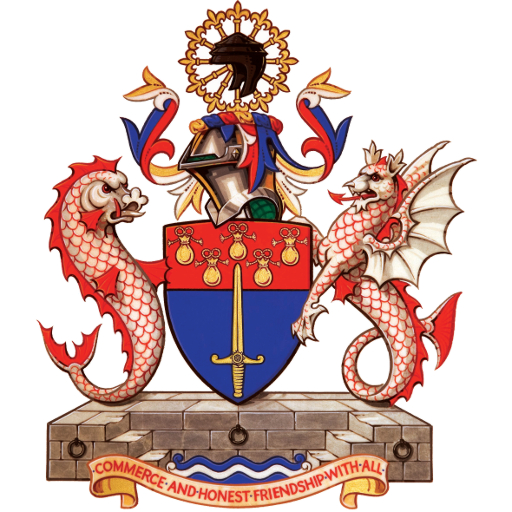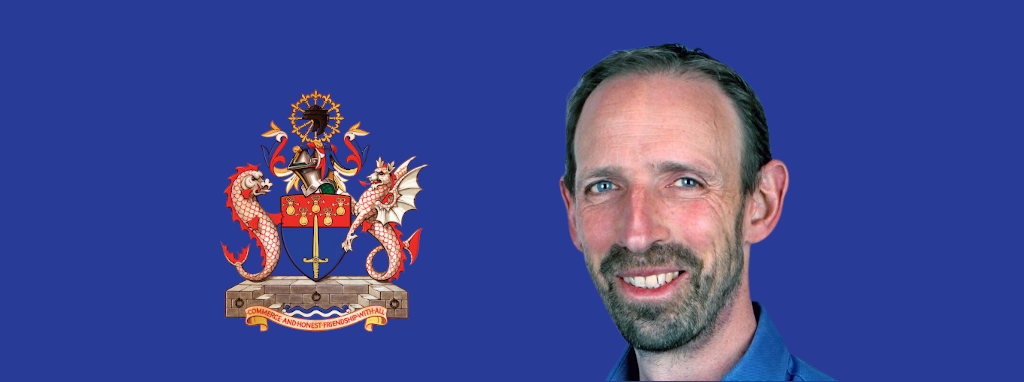Joined by 40+ guests, including friends from the Worshipful Companies of Management Consultants, Information Technologists, Actuaries, and Chartered Secretaries and Administrators, the latest in the series of virtual lunchtime lectures was opened by the Master Sue Algeo. Welcoming all, she recalled an earlier conversation with today’s lecturer, Alex Jacobs in which he said that his lecture would contain some uncomfortable home truths (to which she replied that we love a challenge!) Alex then set the scene and gave the audience a taste of what was to come with the statement “London and the City are wonderful places. But they have always had their dark side”.
He started by turning the clock back to 1599 and the establishment of the East India Company and how it marked a new chapter in global trade and commerce. It was one of the great engines of the Empire, powering centuries of British wealth and domination. But to balance the views he described how in 1765 when the Company gained the right to tax Bengal’s 20 million citizens, it became enmeshed with the extraction of wealth, impoverishment and the distortion of government at vast scale and incalculable human cost.
Alex then brought us back to contemporary times of how the UK still enables extraordinary global trade and is self-evidently a powerhouse of finance and commerce, a truly world leading international centre. But he then went on to discuss aspects of its dark side, asking two questions: First: how big is the problem? Second: what can we all do about it?
Answering the first point, he used a powerful recent example of the extraordinary case of Isabel dos Santos, the daughter of the previous President of Angola. She was reported as Africa’s richest woman with a fortune of $2bn, however in January 2020, a set of leaked papers detailed incredible levels of corruption in her affairs. The leaked papers laid out close connections between events in Angola and international financial centres, like London. Alex continued with further compelling evidence that corruption is systemic and that the UK plays a central role in enabling dirty money to flow around the world. In fact, the National Crime Agency’s official estimate is that over £100bn is laundered through the UK every year. The head of its National Economic Crime Centre says, “that in some cases up to half of the money laundered out of Russia goes through UK corporate structures”. This was confirmed by the 2020 leak of Suspicious Activity Reports known as ‘the FinCEN Files’, which provided a rare insight into $2tn worth of transactions. They included lurid revelations, such as covert political donations. Five years ago, the Panama Papers showed much the same thing, opening a ray of sunlight into the shadows of the offshore industry.
After many more examples of damning evidence were delivered, Alex then turned to his second discussion point: what can we all do about it?
Our government regularly describes Britain as “a force for good” in the world. This is often the case as we have a wonderful track record of leadership in international affairs. However, Alex gave evidence on how the successive governments have had a massive blind spot about the impact of our network of tax havens, not all together surprising, given how established our offshore centres have become over decades, how central to the interests of people in positions of power and influence, how much money is involved.
It was not all doom and gloom as the final segment of the lecture focused on what progress is being made and how the Joffe Trust, founded by Lord Joel Joffe (who also notably represented Nelson Mandela at his historic trial in 1964) works passionately for social justice. Over the last ten years, while being led by Alex, it has become the UK’s most engaged funder in the field of fighting corruption and tax abuse, playing a pivotal role in helping the UK to fight dirty money. It has been responsible for major policy innovations such as the 2010 Bribery Act, Unexplained Wealth Orders, and the extraordinary commitment to transparency around the beneficial owners of companies across all our offshore centres.
To make further progress the Joffe Trust has developed a five-point plan:
1/ Build awareness and urgency.
2/ Pursue the next set of policy reforms, such as resourcing our enforcement agencies adequately, building on the substantial public support for progress in these areas (voters really hate it when big business and the elite dodge the rules).
3/ Support responsible business, covering everything from human rights in supply chains to staff conditions and – increasingly – tax arrangements.
4/ Strengthen alliances. There is common cause between the fight for integrity in international finance and the movements to tackle climate change, inequality, and other social harms.
5/ An urgent need to invest properly in the activists who are driving this agenda. Alex himself has convened strategic retreats bringing the key activists together over recent years. Unfortunately, his opponents are extremely well resourced and connected, whether they represent big business or billionaire activists.
The lecture successfully illustrated some of the current connections between what happens here in the UK and the real effect on people around the world. Alex left us with a choice: we can choose to maintain the existing systems to maximize short term profit or, we can choose to get organized to dismantle what is harmful and unleash real competition and innovation. Before the lecture finished Alex gave a rallying call for help. If you require further details, we will happily put you in touch with him and the Joffe Trust.
A great range of questions followed, from probing whether any government has truly taken this problem on, to the success of suspicious activity reports filed by banks.
As the Master correctly surmised, some uncomfortable truths were communicated, which made for a fascinating hour and will give us all another perspective when walking through the wonderful City.
The full text of the lecture can be read here.
Please look out for further Lunchtime lectures as they promise to be as interesting as this one!

